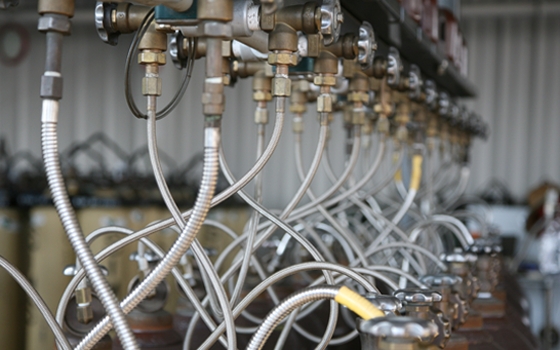Saudi Arabia’s industrial gas infrastructure will continue to grow to support the planned projects in energy and non-energy sectors.
The kingdom plans to make huge capital expenditure across all industry sectors and this is expected to spur the industrial gases sector, according to a report by the National Commercial Bank (NCB).
The “Saudi Industrial Gases Sector Report” said NCB estimates that actual project capital expenditures will be SR238.2 billion ($64.83 billion) for the year.
Industrial gases is a generic term used to describe a wide range of atmospheric and fuel gases and gas mixtures. Industrial gases are produced by a wide range of methods, with main methods comprising air separation units (ASU).
The report also said that growth in the international industrial gases sector is driven by growth in Asia (namely China, India and Korea), overall high energy costs and climate change initiatives.
In the Middle East, SABIC is the largest producer of air separation gases, with a market share of 27.8 percent.
SABIC operates directly in the market, as well as indirectly vis-a-vis National Industrial Gases Company (NIGS), which is 70 percent, owned by SABIC – with the rest being owned by National Gas and Industrialization Company and other smaller gas firms. According to IHS Chemical estimates, four Saudi companies rank among the top 10 producers.
According to the report, the Saudi industrial gases sector has witnessed the acquisition of shares of local firms by international partners to leverage expertise, or otherwise the formation of joint ventures for exploring opportunities in the Kingdom.
The report said the market continues to be fragmented and the pricing of gases differs across the regions due mainly to logistical factors.
Key industries include those in the refining, petrochemical, power, waste minimization/sulfur treatment plants, and steel/ glass sectors. Large-scale gasification plants, such as Jazan’s IGCC (integrated gasification combined-cycle) which will be located in Jazan Economic City, and the oxygen-based gas-to-liquid plants consume large quantities of oxygen. In addition, large volumes of liquid natural gas (LNG) have accelerated the demand for nitrogen.
According to data from the Central Department of Statistics and Information (CDSI), Saudi Arabia imports and exports four main gases – argon, helium, nitrogen and oxygen.
ifpinfo
18 January























































